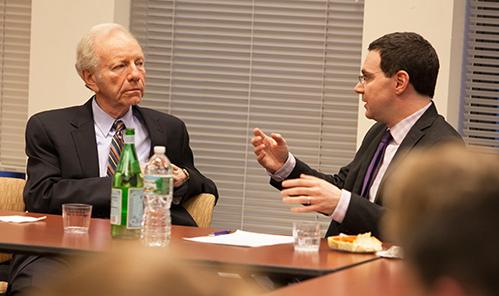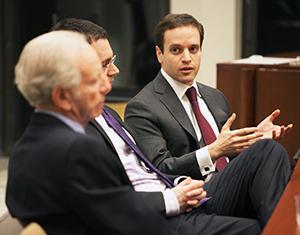Hertog Program on Law and National Security Offers Insight into Conflicts Around the World
Columbia Law School Professor Matthew Waxman and Former Senator Joseph Lieberman Discuss Congressional Role in Foreign Policy with Students and Alumni
New York, February 26, 2015—If Congress were to approve an authorization for the use of military force (AUMF) against the Islamic State of Iraq and the Levant (ISIL) it would send a message to the world that the United States stands together with its allies in opposition to violent extremism, former Senator Joseph I. Lieberman told a group of Columbia Law School students, alumni, and guests at a Feb. 18 roundtable held by the Roger Hertog Program on Law and National Security.
“I would prefer an imperfect AUMF to no AUMF,” said Lieberman, who spoke at the invitation of Columbia Law School Professor Matthew C. Waxman, faculty co-chair of the Hertog Program and adjunct senior fellow with the Council on Foreign Relations.
| Former Senator Joseph I. Lieberman, left, talks with Professor Matthew C. Waxman, faculty co-chair of the Roger Hertog Program on Law and National Security, at a Feb. 18 roundtable. |
Lieberman knows more than a little about the subject—he sponsored the 1991 resolution authorizing the use of force against Iraq—and for the past year, he has shared his expertise and knowledge with Columbia Law School through the Hertog Program. In the fall and spring of 2014, Lieberman co-taught Congress in American Foreign and Defense and Policy, an innovative seminar at the Law School that offered students a behind-the-scenes look at the relationship between the executive and legislative branches of the U.S. government.
| Hertog fellow Vance Serchuk |
Waxman and Lieberman are formidable experts on foreign defense and policy issues. Waxman has held senior positions at the U.S. Department of State, Department of Defense, and National Security Council; Lieberman was a U.S. senator for more than two decades until he retired at the end of 2013, serving most recently as chairman of the Homeland Security and Governmental Affairs Committee and a senior member of the Armed Services Committee. They were joined in the fall seminar by Vance Serchuk, who served as Lieberman’s senior national security adviser for six years and now is a fellow at the Hertog Program.
The opportunity to work with full-time faculty, lecturers, and fellows who are current or former senior-level government officials is what makes the Hertog Program so rare among law schools, Waxman told the students and alumni who gathered at the reception to discuss some of the threats the U.S. is facing around the world. Private and public sector alumni who work in the national security field participated in the event as well. Those present included Kenneth A. Caruso ’77, a former deputy associate attorney general and current partner at White & Case whose specialties include financial and economic sanctions; Caitlin Street ’11, who has been serving as an attorney within the U.S. intelligence community and was a founder and president of Columbia Law School’s National Security Law Society; and Benjamin A. Naftalis ’04, a former terrorism prosecutor in the Southern District of New York who recently joined Latham & Watkins.
Lieberman, Serchuk, and Waxman debated issues ranging from the standoff in the Ukraine and Israeli Prime Minister Benjamin Netanyahu’s upcoming visit to Congress to negotiations over Iran’s nuclear program. Guests asked questions about the balance of power between the president and Congress and possible solutions to various crises around the globe.
| National security law alumni, including Kenneth A. Caruso '77 (left), and current Columbia Law School students participated in the roundtable. |
One attendee asked whether it would be wise for the U.S. to arm the Ukrainians against Russia since weapons given to the Iraqi Army ended up in the hands of ISIL.
Serchuk said the situations were not the same.
“There’s nothing we would give the Ukrainian Army that Russia doesn’t already have,” he said. “Here we’d be supporting a much weaker force against a much stronger force where in Iraq the calculus was totally different.”
The Hertog Program on Law and National Security features a rigorous and innovative curriculum that integrates the study of law, foreign policy, and strategy. It draws on the unique government experience of permanent and adjunct faculty, and supports research by faculty members and students to produce policy-relevant scholarship on cutting-edge issues as a lasting contribution to the field.


